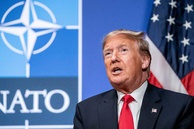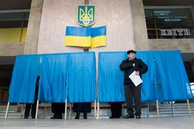The attempts by the external forces to organize a “Maidan” in Georgia (one of the Trans-Caucasian countries) with the assistance of pro-western NGOs and some of the pro-western groups among the population indicates their desire to see Tbilisi as part of the anti-Russian coalition on the post-Soviet space.
So far, the coalition consists of Ukraine, Moldova and the Baltic republics. As for Azerbaijan, its position is somewhat unclear. On the one hand, Baku and Moscow have long been linked by good neighbourly relations. On the other, while Azerbaijan claims that it has been rendering humanitarian (?) assistance to Ukraine, some media reports argue that Ukrainian Armed Forces are using weapons supplied from Azerbaijan. In the meantime, the growing influence of Turkey is spilling into Ankara acquiring more say in Azerbaijan’s regional policy.
Turkey has its own vision of the Caucasian future, which is at odds with the West’s plans for the region. Given that Ankara has no intention of aggravating relations with Moscow, sticks to its own stance on the issue of Sweden’s and Finland’s membership in NATO, and criticizes US and EU policies on the international scene, there are grounds to assume that to destabilize the situation in the Trans-Caucasian region through Turkey will be, if not outright impossible, then extremely difficult. For the West, however, such a scenario is highly welcome in order to create one more hotbed by the Eurasian borders and make Russia pull some of its forces out of other hot spots, such as, Ukraine.
The anti-Russian opposition in Transcaucasia will be incomplete without Georgia. The bill on foreign agents (first initiated and passed in the USA in 1938), which served as a pretext for the anti-government protests in Tbilisi and under which legal and physical persons are pronounced foreign agents if 20% of funding for their activity comes from abroad, has been revoked (1). A statement to that effect came from representatives of the Georgian Dream party, “The Power of the People” Public Movement, and the parliamentary majority. The attempt by the Georgian authorities to guarantee national sovereignty and prevent foreign forces from meddling in the country’s domestic policy had failed, momentarily running into harsh criticism from the EU and the USA. As it happens, some countries are free to have such laws, while others can’t – because it is undemocratic. Nevertheless, the bill, as the authorities say, will remain a point for discussion with representatives of the public in the future.
The incumbent government in Georgia are doing their utmost to prevent Georgia from being dragged into the ruinous direct confrontation with Russia. According to diplomatic rhetoric, Tbilisi is an ally to Kyiv, while in reality, it is one, but to a certain extent. Although Georgia is supplying Zelensky with humanitarian aid and even poses no obstacles to its residents joining the military operations on the Ukrainian side, it refuses to participate in the economic blockade of Russia and deliver weapons to Ukraine.
In turn, Kyiv has demonstrated that it does not value relations with the current Georgian authorities. What proves it is the tragic comedy about the dispatch of former President Michael Saakashvili to Georgia for the purpose of masterminding a return of Tbilisi’s foreign policy in the direction of Kyiv. What Kyiv is demonstrating is that it is ready to have a hand in overthrowing any government in any of the post-Soviet republics, if it can benefit from it and if it matches the intentions of the western supervisors. By now, Ukraine has turned into a dangerous neighbor and supplier of instability on the post-Soviet space.
Connivance with the Zelensky regime has played an evil joke on Tbilisi. The Georgian militants, who have been fighting for Ukraine and are thus distinguished by more radical views than Georgian President Salome Zourabichvili, are coming back amid the explosion of political discontent at home. They are bringing back their combat experience and a desire to follow the example of Ukrainian nationalists and forcefully rush into the Georgian policy. They are fully capable of becoming a striking force of a new ‘colour’ revolution in Georgia.
Georgia’s external supervisors find a forceful scenario suitable. Just as they found it suitable during the “Maidan” or its attempts in Kyiv, Minsk, Kishinev. How far Washington and Brussels will go in their plans, is unclear, but their interest in the project is evident.
Georgia used to be part of GUAM (Georgia - Ukraine - Azerbaijan - Moldova). The bloc was designed for the sole purpose of presenting an alternative to Russia as an integrated force for the disruption of consolidation processes on the Eurasian space. Integration in the style of GUAM is a purely ideological integration of opponents to the development of Eurasian economy. It presupposed no economic dividends and it did not yield any.
Today, we can talk about though inert but a league of countries that were earlier united by the GUAM bloc. Some members of the bloc adhere to genuinely Russo phobic policies (Ukraine, Moldova), while tend to support the strengthening of cooperation with external players beyond the former USSR (Azerbaijan is actively collaborating with Turkey and not only Turkey). Georgia is currently in limbo, speaking of its readiness for anti-Russian policies, hanging somewhere between Moldova and Azerbaijan, which does not suit the western developers of the GUAM strategy.
The western focus on Georgia can be explained by Washington’s and Brussels’ view of the Black Sea as a gravitation hub for NATO’s eastern policy (2). If such a policy is to be a success, they will need to involve post-Soviet republics into the orbit of the military and political policy of the West. The role of the mediator between the US and the EU, on the one hand, and Georgia and Moldova, on the other, is to be played by Romania, as a Black Sea nation. Romаnia’s Foreign Ministry repeatedly made it clear that without the participation of Georgia and Moldova it would be extremely difficult to deter Russia in the Black Sea (3). Georgia and Moldova are the springboards for a militaristic pressure on Russia both in the Black Sea region and in the Black Sea water space.
In October 2022, Bucharest and Tbilisi signed the Declaration “On the Formation of Strategic Cooperation between Georgia and Romania”, which envisages annual discussions of security issues and a dialogue between the two countries’ parliaments. The document outlines the near-future objectives – to connect the Black and Caspian Seas by cargo and digital routes and an energy corridor, which will enable Caspian energy resources to enter the European market via the Black Sea.
The dynamic developments in the Russian Special Operation zone in Ukraine are prompting the western diplomacy to build up forces and act faster. Hence the drastic methods they resort to in order to drag Georgia into the comprehensive strategy of confrontation with Russia, which becomes clear from the ‘incited’ clashes between the protesters and the police. Meanwhile, far from all residents of Georgia support the appeals to topple the government. Thus, we can expect regular ‘assistance’ for the Georgian opposition from western countries, the more so since the EU and the US have openly outlined their position on the issue.
1) https://ria.ru/20230309/protesty-1856654106.html
2) https://www.fondsk.ru/news/2023/02/24/rumynia-vse-dlja-protivodejstvija-rossii-58599.html
3) https://jurnalul.ro/stiri/observator/aurescu-dezbatere-securitate-marea-neagra-nato-924235.html
read more in our Telegram-channel https://t.me/The_International_Affairs

 10:45 11.03.2023 •
10:45 11.03.2023 •



























